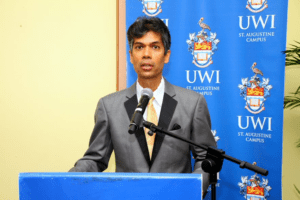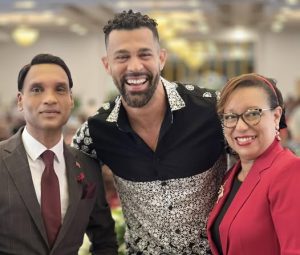
CARIBBEAN men are constantly demanding more nudity and the US media is willing to supply this insatiable desire.
In the 21st century, pornography has the potential of redefining Caribbean masculinity from being family-oriented, emotionally stable and protective to one that is distorted, destructive and focuses on the physical body.
Undoubtedly, pornography also encourages promiscuity and increases the chances of contracting sexually transmitted diseases such as HIV and AIDS. In the Caribbean, AIDS is one of the major diseases affecting adults especially those in the age group 24 to 49 years. The US movie Pretty Woman portrayed the lead actor falling in love with a prostitute. This was a distorted and glamorous portrayal of a serious condition plaguing the world.

The troubling question plaguing the Caribbean and other societies is if abstinence or sex after marriage and a monogamous relationship be promoted.
There is strong evidence that sexually curious teenagers in schools in Trinidad and Tobago be educated on the use contraceptives. In 2003 serious concerns were expressed among certain sections of the society in Trinidad and Tobago when the daily newspapers published a report of a youth group distributing condoms to students of a secondary school.
The issue of freedom of choice is critical among West Indian teenagers and young adults who are continually exposed to sex in the US media. The age in which West Indian children should be exposed to sex education and the extent of this awareness at schools is a problem which is difficult to assess. Parents cannot continue pretending that their children are not sexually active at school. In most Caribbean homes, sex education in homes and schools is no longer a taboo subject.
The US media is guilty of encouraging this AIDS epidemic in the Caribbean. Soap operas such as the Bold and Beautiful, Young and Restless and One Life to Live depict a high level of sexual activity among unmarried persons.
This genre of television programming has resulted in an increase in common-law relationships in the Caribbean societies that have been frowned upon by traditional parents and older persons. Movies as Basic Instinct and certain half- hour comedies as Friends and Seinfeld occasionally portray couples who engage in casual sex without any thought of disease or long-term commitment.
The extramarital affairs in movies do not assist the West Indian males in reforming themselves. In the Caribbean, there is the common practice of men– including husbands and fathers, to have a sexual relationship outside of the marriage.
This is locally referred to as ‘horning’ and the outside woman known as a ‘deputy’. This infidelity is also known as tabanca. In the Caribbean, the macho image of the man being virile and able to satisfy or sleep with a number of women is a proud boast among friends in rum shops and bars.
Thus the coverage of the sex scandal involving Bill Clinton and Monica Lewinsky was viewed by Caribbean men as a normal manly urge being satisfied. The women also engage in extramarital trysts but this phenomenon does not seem as common as the men. West Indian men are adversely affected when their wives or girlfriends are rumored to be unfaithful or actually have an outside affair. This results in beatings or the death of the female. It is obvious that the US media is constantly reinforcing images in which the traditional sanctity of sex being reserved for marriage is rapidly eroding. Sex has become a cheap thrill in which partners are easily changed without any fear of the dire consequences on one’s mental or physical health. The prognosis looks grim as the US media is entrenched in the minds and homes. And we need to ask ourselves- is the damage is irreversible?
Dr Jerome Teelucksingh is an activist. He initiated the inaugural observances of International Day for the Elimination of Violence Against Men and Boys (January 31) and World Day of the Boy Child (May 16). He has made academic presentations at tertiary institutions including Harvard University and Oxford University.
See other articles by Dr Jerome Teelucksingh on AZP News:
Naps Girls: From Humble Beginnings to Excellence
US Media Creates Cultural Dependency in the Caribbean
Bloodless Revolution to Save Lives in Developing Countries
The Need for a Social and Moral Revolution
The Law of Supply and Demand in Developing Countries
End the Dependency for Developing Countries
T&T Carnival and the Emperor’s New Clothes
The Influence of Labour on Caribbean Integration
The illusion of political Unity
Presbyterians in Trinidad: Humble Missionaries, Local Workers
Religious Plurality: Curse or Blessing
Caribbean Youth Need Optimism, Patriotism
Rethinking Identities in Caribbean, Latin America
November 19: All Inclusive International Men’s Day
Should International Agencies be Blamed for Unemployment
A Need to Observe Word Unemployment Day
An Ideology for the Trade Union Movement
The Man who Couldn’t be Prime Minister
Social Outburst vs Social Revolution
Challenges of the Men’s Movement
If George Floyd was Denied Parole
The Meaning of Indian Arrival Day in T&T
International Men’s Day – A Way of Life
Wounds that cause school violence
May Day: A Time for Solidarity, Strength
Who Coined the Term ‘Black Power’
The illusion of political Unity
Presbyterians in Trinidad: Humble Missionaries, Local Workers
Religious Plurality: Curse or Blessing
Caribbean Youth Need Optimism, Patriotism
Rethinking Identities in Caribbean, Latin America
November 19: All Inclusive International Men’s Day
Should International Agencies be Blamed for Unemployment
A Need to Observe Word Unemployment Day
An Ideology for the Trade Union Movement
The Man who Couldn’t be Prime Minister
Social Outburst vs Social Revolution
Challenges of the Men’s Movement
If George Floyd was Denied Parole
The Meaning of Indian Arrival Day in T&T
International Men’s Day – A Way of Life
Wounds that cause school violence
May Day: A Time for Solidarity, Strength
Who Coined the Term ‘Black Power’
![]()













